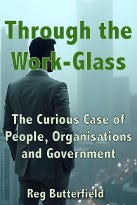Dr Reg Butterfield © 2025
3-minute read + video link
One of the strengths of management newsletters and platforms such as Futocracy.Network is the way people are encouraged to re-consider the nature of organisations, management, and even work itself. With this in mind, let’s try something different.
One of my approaches to work with clients and students, is to help them use different lenses and ways to see, hear, touch, taste, and feel (sometimes smell), what is around them. Most find it difficult. Some use humour as an excuse for not trying (especially the taste and smell), and eventually all are surprised.
They are surprised at what they have experienced because the normal management models, frameworks, books, and tools, tend to re-order what exists at a fairly surface level; yes, even the “5-whys” doesn’t help much as it is a predominantly cognitive process.
For example, when I ask a manager or student to write me a management report as a fairy story, they look at me as if I am mad. If I tell them that I am not interested in their boring PowerPoint presentation, they feel upset; particularly when I ask them to give me the results as a rap song, a poem, exciting video, or some other “non-normal” management approach.
Yet, when they do this strange thing, they are surprised at what they have experienced, seen, heard, felt, and even smelt about the organisation that they never realised existed before.
Education has desensitised us to bring things into a set of prescriptive formats; a form of control that kills curiosity and holds back innovation.
I encourage people to become curious again, after all, isn’t that what good employers and educationalists want?
I challenged myself
So, I set myself a task. I told my colleagues Dr Ross Wirth and Sylvia Calleja de Röpke that I would write some books about management that aren’t normal management book fare. I have written two so far and more are in the pipeline.
The first was published this week on Amazon. It is called “Through the Work-Glass”.
How does this relate to creativity and management?
I have used the style and whimsical world of Lewis Carroll to try and make sense of the world of management, organisations, and governments upon which we are endeavouring to have an impact. If this isn’t our intention, then what is our reason for doing all this change stuff?
You can listen to a podcast review of the book (courtesy of the great Google LLM software) at the link below.
If you prefer a little script to whet your appetite or even turn you off, then here you are:
“But what are the rules?” Alice asked.
The Cat’s grin widened further, which seemed impossible. “Rules? Oh, they’ve been rewritten again. Some say it’s for the better, some say it’s for the madder. You’d best ask the Mad Manager; she’s having tea with the Algorithm.”
…….
“Oh dear,” Alice muttered, peering at a sign that read: “Old rules apply—unless they don’t.”
“Lost already?” purred a familiar voice. The Cheshire Cat appeared, perched atop a precariously balanced stack of KPIs.
“Well, yes,” Alice admitted. “Everything’s so… topsy-turvy. What are the new rules?”
The Cat grinned. “That depends. Are you a Person, an Organisation, or a Government? The rules, you see, change depending on who’s asking.”
If you feel up to it, then join the travels and discoveries of our accidental traveller, Alice.
The book “Through the Work-Glass : The Curious Case of People, Organisations, and Government” is available now on Amazon.




I wasn’t expecting a story to make me think this deeply about change, but this one does. This novel offers a fresh take on navigating change. Reg masterfully dives into the challenges we all face when adapting to a world in flux, in a playful and sometimes quirky way.
This is not the usual “quick-fix” book—it is a creative, insightful, and often eccentric adventure that brings to life complex ideas about leadership, resilience, and adaptation.
The podcast is a great way to get a first impression of the ideas in the book.